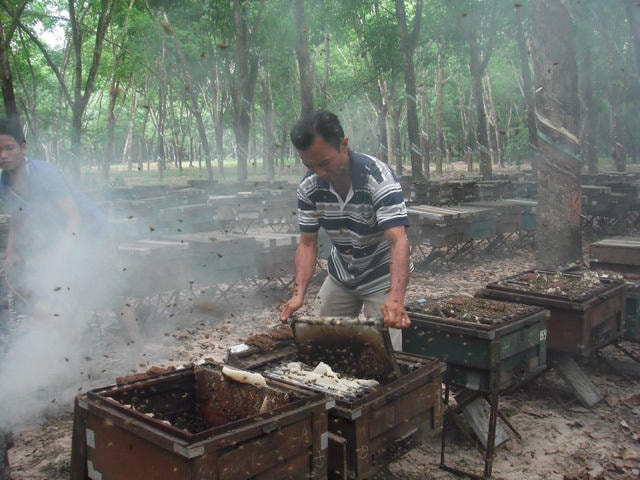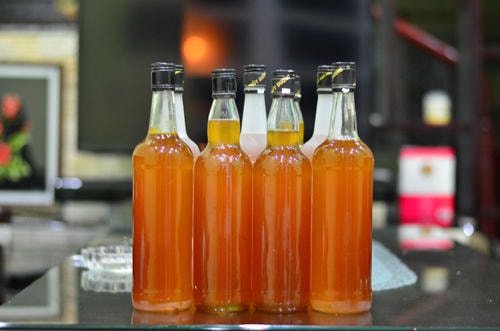Warning about businesses selling 'young' honey
Most beekeepers harvest honey before the right time, meaning the honey is “not yet capped”, leading to fermentation… which is not accepted by many markets.
Mr. Dinh Quyet Tam - Vice President of the Vietnam Beekeeping Association, said that honey used to be a very valuable export product. Our honey products are mainly from bees that suck nectar from hybrid acacia, rubber, cashew and nectar from coffee, lychee, longan and some other flowers.
However, in recent years, the export price of honey has decreased sharply, and many markets have also said "no" to honey products that do not meet standards, are fermented, or contain residual food supplements.
Mr. Tam added that currently, most Vietnamese bee colonies are fed with supplementary feed, mainly feed made from soybeans. Meanwhile, the EU has rejected honey containing supplementary feed residues in the product.
 |
| Raising honeybees in rubber gardens. |
Soybeans are also classified as one of the eight substances that can cause allergies according to the regulations of the US Food and Drug Administration (FDA), one of the 14 substances that can cause allergies in Europe. Since 2000, the US market has accounted for nearly 90% of Vietnam's honey exports. "Therefore, if the US market continues to refuse, Vietnamese honey products will not know where to go," Mr. Tam worried.
In addition, Mr. Lam said that one of the reasons leading to the above warnings from the import market is that most beekeepers today harvest honey when it is not yet "capped". That is, during the process of bees taking honey back to the hive, it will be "processed" into food for their young. When this process is completed, the mother bee will close the hive lid to "preserve" the food product that has just been processed.
Honey products, if harvested when “capped”, are of very good quality, and the honey will not ferment during the export processing process. However, if beekeepers “sell young”, meaning the honey is not yet ripe for harvesting and has not been “capped”, the quality is not guaranteed, it is easy to ferment, not concentrated, etc., so it will be rejected by the market.
“Not to mention the issue of supplementary foods, foods with genetically modified ingredients… Even the cheap honey segment has started to say no to GMOs, and exporting countries have also started to raise organic honey bees,” said Mr. Tam.
 |
| Honey products, if harvested after being "capped", are of very good quality and do not ferment during the export processing process. |
Mr. Ngo Xuan Vinh, a beekeeper in Bao Loc (Lam Dong) also informed that most domestic beekeepers sell "unripe" honey because the time it takes for bees to screw the cap to 90 - 100% takes 15 - 20 days while honey screwed to 30 - 40% takes only about 7 - 10 days but the selling price is still the same.
Therefore, the solution is that businesses and honey buyers must have a water content meter to determine the selling price of each different type of honey, according to the concentration of the product.
“Honey exporting enterprises must also compete fairly in buying and selling, and must regularly monitor bee farms when exploiting honey. The honey export price must be reasonable so that beekeepers do not suffer losses. They need to invest in cold storage to better preserve the product,” Mr. Vinh raised the issue.
Sharing at the workshop “Maintaining and expanding the market share of Vietnamese honey exported to the European market” held in Ho Chi Minh City this morning, Mr. Vinh also said that for many years, beekeepers have been harassed by many subjects, having to pay “protection” money… causing costs to increase while beekeepers do not feel secure in production.
“Local authorities must create security conditions for beekeepers, because as it is now, the situation of “protection” and extortion… is happening a lot, making beekeepers very insecure,” said Mr. Vinh.
According to Dan Viet Newspaper
| RELATED NEWS |
|---|

